MercoPress. South Atlantic News Agency
Tag: Marine Protected Area (MPA)
-
Saturday, October 31st 2020 - 08:42 UTC
Expanding marine protected areas by 5% could boost fish yields by 20% – but there’s a catch

By Peter JS Jones and Rick Stafford - Marine protected areas, or MPAs as they’re more commonly called, are very simple. Areas of the sea are set aside where certain activities – usually fishing – are banned or restricted.
-
Friday, August 30th 2019 - 09:29 UTC
Johnson at G7 summit led the way in ocean protection; Ascension island declares 100% of its waters an MPA
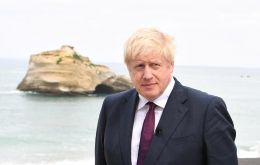
During remarks at the close of the recent G7 summit in Biarritz, British Prime Minister Boris Johnson said that the Aichi targets—goals set nearly a decade ago as part of the United Nations’ Strategic Plan for Biodiversity—must be “replaced with new, more ambitious targets to help us get back the biodiversity that this planet is losing, and has lost.”
-
Monday, October 30th 2017 - 10:45 UTC
UK’s work on protecting the oceans has won deserved praise – now we must go further

By Matthew Offord MP for Hendon - UK leadership on ocean conservation has won international acclaim. The landmark “Blue Belt” policy to work with the UK Overseas Territories to “create the largest marine sanctuaries anywhere in the world” has only furthered this standing, with commitments to create large protected areas around Ascension Island and Tristan da Cunha in 2019 and 2020 respectively already widely welcomed.
-
Thursday, September 7th 2017 - 07:14 UTC
UK Overseas Territories have 4 million sq. km. of marine protected areas.
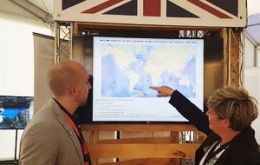
The United Kingdom is showcasing its expertise in marine conservation and protection at the 4th International Congress of Marine Protected Areas in La Serena, Coquimbo, Chile, which extends until next 8 September.
-
Saturday, November 5th 2016 - 09:10 UTC
Why Falklands' conservation and management zone is so productive
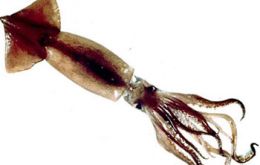
Three decades ago, on 29 October 1986 a Proclamation declaring the Interim Falklands Conservation and Management Zone was signed by then Governor Jewkes, which helped to transform the Islands economy. The anniversary has been marked by several events, and this week was the turn for a scientific approach on how and why the waters around the Falklands are so rich in marine life.
-
Thursday, February 19th 2015 - 05:30 UTC
Ascension and South Sandwich islands proposed for marine protected areas
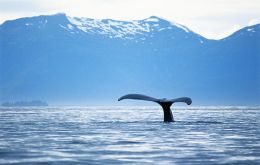
Ahead of the May 7 British general election, a coalition of conservationists and high-profile supporters has called upon the UK government to create three marine reserves that together would more than double the world’s protected waters, reports Inhabitat.
-
Friday, May 9th 2014 - 06:13 UTC
Strong commitment to support Marine Protected Areas in Southern Ocean
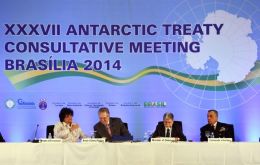
The Antarctic and Southern Ocean Coalition (ASOC) joined member states of the Antarctic Treaty, along with observer and expert organizations, in Brasilia this week to discuss measures for the protection of the Antarctic environment.
-
Monday, October 21st 2013 - 19:42 UTC
Fears that proposal for MPA in the Ross Sea will again succumb at CCAMLR

The world's biggest marine reserve in Antarctica may have to be given an expiry date to get countries with interests in the prized waters to agree to it. Delegations from 25 nations are resuming in Tasmania a New Zealand-US proposal for a marine protected area (MPA) in the fish-rich Ross Sea, 3500km south of New Zealand.
-
Wednesday, July 17th 2013 - 19:35 UTC
Russia blocks creation of two huge Marine Protected Areas in Antarctica

An extraordinary meeting of the Commission of Antarctic Marine Living Resources (CCAMLR) to establish Marine Protected Areas (MPA) in the Ross Sea region and in East Antarctica wrapped up on Tuesday without an agreement after Russia with support from Ukraine blocked the initiative.
-
Wednesday, January 23rd 2013 - 09:02 UTC
South Georgia implements additional measures to safeguard Marine Protected Area

The United Kingdom Minister for the Overseas Territories Mark Simmonds welcomed the announcement of a set of additional measures to safeguard the sustainable-use Marine Protected Area (MPA) around the South Georgia and South Sandwich Islands.
